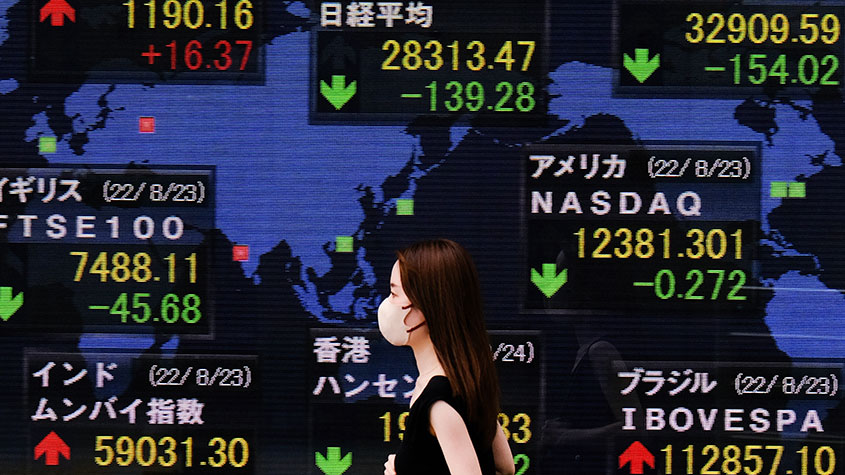A do-it-yourself ETF portfolio
Take advantage of the low-cost exchange-traded funds disrupting the market.

Get the latest financial news, insights and expert analysis from our award-winning MoneyWeek team, to help you understand what really matters when it comes to your finances.
You are now subscribed
Your newsletter sign-up was successful
Want to add more newsletters?

Twice daily
MoneyWeek
Get the latest financial news, insights and expert analysis from our award-winning MoneyWeek team, to help you understand what really matters when it comes to your finances.

Four times a week
Look After My Bills
Sign up to our free money-saving newsletter, filled with the latest news and expert advice to help you find the best tips and deals for managing your bills. Start saving today!

Take advantage of the low-cost exchange-traded funds disrupting the market.
For most MoneyWeek readers, the emergence last month of a new issuer of exchange-traded funds (ETFs) in Europe wasn't a big event. The European market is already intensely competitive, with big-name brands such as BlackRock, iShares and Vanguard slugging it out with big asset managers and smaller, innovative players.
So the news that UK giant Legal & General Investment Management (LGIM) has finally entered the mainstream market with a range of "core" main-market index trackers didn't make front-page news.
MoneyWeek
Subscribe to MoneyWeek today and get your first six magazine issues absolutely FREE

Sign up to Money Morning
Don't miss the latest investment and personal finances news, market analysis, plus money-saving tips with our free twice-daily newsletter
Don't miss the latest investment and personal finances news, market analysis, plus money-saving tips with our free twice-daily newsletter
LGIM's new range prompted comment because its index trackers operate a negative screen: they exclude certain types of stocks. This means the index the fund is tracking excludes stocks on a "future world protection" list. The fund won't include some notorious arms manufacturers, coal businesses and outfits that contravene the UN Global Compact (a non-binding agreement to encourage firms to adopt sustainable and socially responsible practices).
Costs dropping like a stone
But what I found more interesting was the pricing of LGIM's offering. The six new ETFs are all priced at between 0.05% (for the UK and Europe excluding UK) and 0.1% (for the rest of the world, including an Asia Pacific tracker and a US tracker). They compare favourably with products from iShares and Vanguard. One of the latter's biggest tracker funds is based on the FTSE 100 index and costs just 0.06%.
In fact, the cost of ETFs is dropping like a stone. Over in the US, big issuers such as Fidelity have been shouting about their zero-fee ETFs, while in Europe the battle seems to be about getting the pricing of mainstream trackers below 0.1%. All of this raises a tempting prospect. Investors should now be able to put together a portfolio of main-market index trackers, including ones that invest in the US, the UK, Europe, Japan and Asia Pacific (ex-Japan), for an average price of less than 0.1%.
At this price, robo-advisers and digital wealth managers face an awkward question: why invest in their products (for charges of around 0.50%) if you can do it yourself for under 0.1%? You should also be able to stuff this portfolio full of ETFs by different issuers, so you won't be entirely dependent on iShares or Vanguard. LGIM's intervention raises the stakes in this price war and throws in a simple exclusion screen for next to nothing.
The other key issue raised by the LGIM launch is that, in future, you'll need to look much more closely at the index your fund is tracking. LGIM is using a fairly unusual index series that tracks the main asset classes but doesn't use a well-known index provider such as MSCI, FTSE or S&P Dow Jones. So, for instance, with the UK version of the range you're not tracking the FTSE 100 or FTSE All-Share. Instead, it's an index that looks and feels like the FTSE, but which is managed by a small index provider called Solactive.
Why pay for the index brand?
LGIM has done this because mainstream index developers charge a substantial amount of money to license their brands. These global index firms are highly profitable, boasting sky-high operating margins. If you're only charging a handful of basis points for running an ETF, why hand over some or most of those basis points to a big brand?
In effect, our money is increasingly being used to pay for big brand names to maintain their oligopoly. This model is ripe for disruption, and the answer might be self-indexing (where the issuer runs their own index) or bringing in smaller index firms who work with the issuer (the LGIM model). As these alternative models proliferate, investors should expect the fees charged on big, main-market ETFs to start to tumble below 0.05%.
Activist watch
Nestl is facing the accusation that its corporate governance set-up is hampering growth, says Leila Abboud in the Financial Times. Corporate governance practice in the UK and US "typically frowns upon" chief executives becoming board chairmen and overseeing their successors, which has been the situation at Nestl for decades. Activist investor Third Point, which owns 1.25% of the group, has now suggested that chairman Paul Bulcke, Nestle's chief executive from 2008 to 2016, "seems too comfortable with the status quo", which risks "holding up the pace and magnitude of change".
Short positions... passive investing has gone too far
Index-fund assets invested in stocks now total some $4.6trn, while total index-fund assets have surpassed $6trn (these are funds that merely track the market rather than trying to beat it). But what happens when the index fund becomes too successful for its own good, asks Jack Bogle, creator of the first index fund and founder of passive-investing giant Vanguard, in The Wall Street Journal. If historical trends continue, a handful of giant institutional investors will one day hold voting control of every large US corporation.
Public policy cannot ignore this growing dominance, and must consider its impact on the financial markets, corporate governance, and regulation, says Bogle. "I do not believe that such concentration is in the national interest." Tentative solutions to the problem, he reckons, include more competition from new entrants to the index field, and forcing giant index funds to spin off their assets into separately managed entities.
If you're a fan of star fund manager Terry Smith's no-nonsense investment style, then arguably a possible opportunity has opened up in his Fundsmith Emerging Equities Trust, says Gavin Lumsden on Investment Trust Insider. On Monday the shares were trading at 3% below their net asset value, which is "unusual" for a £308m trust that has traded at a premium for much of the past four years.
The discount has emerged after the trust's share price failed to keep pace with a sharp recovery in the portfolio following the market downturn in October. Smith has clearly not delivered in emerging markets in the way he has in developed markets with his flagship fund, says Lumsden. "I would urge anyone thinking of piling in to consider its underperformance of the past three years" first.
Get the latest financial news, insights and expert analysis from our award-winning MoneyWeek team, to help you understand what really matters when it comes to your finances.

David Stevenson has been writing the Financial Times Adventurous Investor column for nearly 15 years and is also a regular columnist for Citywire.
He writes his own widely read Adventurous Investor SubStack newsletter at davidstevenson.substack.com
David has also had a successful career as a media entrepreneur setting up the big European fintech news and event outfit www.altfi.com as well as www.etfstream.com in the asset management space.
Before that, he was a founding partner in the Rocket Science Group, a successful corporate comms business.
David has also written a number of books on investing, funds, ETFs, and stock picking and is currently a non-executive director on a number of stockmarket-listed funds including Gresham House Energy Storage and the Aurora Investment Trust.
In what remains of his spare time he is a presiding justice on the Southampton magistrates bench.
-
 Should you buy an active ETF?
Should you buy an active ETF?ETFs are often mischaracterised as passive products, but they can be a convenient way to add active management to your portfolio
-
 Power up your pension before 5 April – easy ways to save before the tax year end
Power up your pension before 5 April – easy ways to save before the tax year endWith the end of the tax year looming, pension savers currently have a window to review and maximise what’s going into their retirement funds – we look at how
-
 Is BlackRock World Mining gearing for a recovery?
Is BlackRock World Mining gearing for a recovery?Opinion After a frustrating year, BlackRock World Mining is positioned for growth and to capitalise on the sector's recovery
-
 Will the BlackRock World Mining Trust fund strike gold?
Will the BlackRock World Mining Trust fund strike gold?The BlackRock World Mining Trust looks like a compelling alternative to a pure play on gold explorers. Is it good enough?
-
 Could your tracker fund be costing you a small fortune?
Could your tracker fund be costing you a small fortune?A tracker fund is an excellent way to invest in the market while keeping costs low, but some platforms are far more expensive than others. We look at the worst offenders.
-
 What is an index fund?
What is an index fund?Glossary We outline everything you need to know about index funds, from what they are and how to buy them, to the things to consider before you do so.
-
 Low-cost index funds for simple investing
Low-cost index funds for simple investingTips Index funds are an easy, low-cost way for investors to invest in a sector or asset class. Here’s a selection of the cheapest passive tracker funds on the market right now
-
 A Europe-focused investment trust that’s back on form
A Europe-focused investment trust that’s back on formTips Alex Darwall’s European Opportunities investment trust deserves another look after a difficult spell, says Max King.
-
 Mining stocks are back in favour – but proceed with caution
Mining stocks are back in favour – but proceed with cautionTips This investment trust packed with mining stocks has risen by 70% since the end of 2019, but investors should be cautious about assuming “this time is different”, says Max King
-
 What is a tracker fund?
What is a tracker fund?Instead of trying to beat the market, tracker funds – also known as “passive” funds – try to track its performance. Here's what that means.